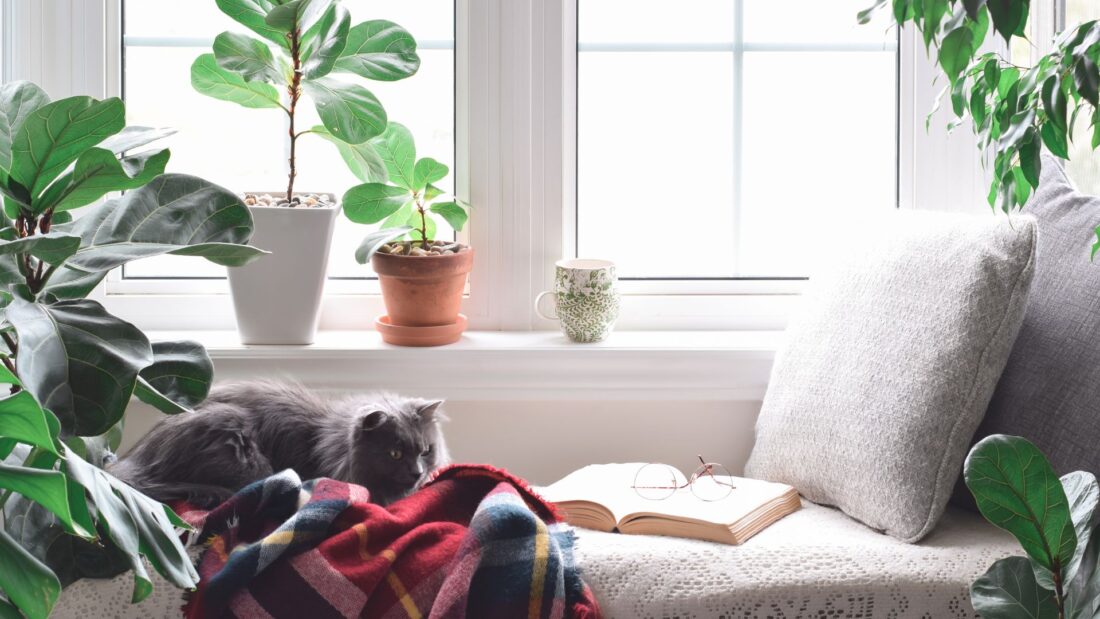Introvert’s Haven: Designing Homes for Peace and Solitude
The term ‘introvert’ refers to individuals who gain energy from their internal world of thoughts, feelings, and ideas, often preferring to engage in solitary activities and needing time alone to recharge after social interactions. This inward orientation does not equate to shyness or antisocial tendencies; rather, it reflects a preference for quieter, more minimally stimulating environments.
Introverts often engage in activities such as reading, writing, painting, or meditating at home, providing time for self-reflection and creativity. Their needs typically involve personal space for solitude and tranquil environments that foster their reflective nature.
Here are ten interior design ideas tailor-made for introverts, each illustrating its relevance to this personality type and offering tangible examples.
- Cosy reading nooks: Introverts often seek solace and rejuvenation in quiet moments of solitude. Designing cosy reading nooks with comfortable chairs, soft lighting, and built-in bookshelves creates a serene and intimate space where introverts can retreat and indulge in their love for books and personal reflection. This idea is supported by Susan Cain’s book, “Quiet: The Power of Introverts in a World That Can’t Stop Talking”, which discusses the need for introverts to have a quiet space for solitude.
- Soft and muted colour palettes: Introverts tend to appreciate calm and soothing environments. Soft and muted colour palettes, such as pastel shades, earth tones, and neutrals, create a sense of tranquillity and provide a peaceful backdrop that complements their introspective and contemplative nature. Studies published in “Color Research & Application” indicate that certain colours can have significant effects on mood and stress levels, with neutral colours often being seen as more calming.
- Intimate conversation areas: Introverts value deep and meaningful conversations with close friends or family members. Designating intimate conversation areas with comfortable seating arrangements, such as cosy sofas or armchairs grouped around a coffee table, creates a private and inviting space for meaningful discussions without overwhelming social stimulation.
- Home office or study space: Introverts thrive in quiet and focused environments. Providing a dedicated home office or study space allows introverts to have a secluded area where they can concentrate, work, pursue creative hobbies, or engage in personal projects without distractions. This aligns with the psychological research that introverts are often deeply focused and passionate about their interests.
- Nature-inspired elements: Introverts often find solace and inspiration in nature. Incorporating nature-inspired elements, such as indoor plants, natural textures (wood, stone), or nature-themed artwork, brings a sense of tranquillity and connection to the outdoors, providing introverts with a peaceful and grounding atmosphere. Views of the outdoors can also provide a calming environment for introverts.
- Soft ambient lighting: Introverts often feel more comfortable in dimmer, softer light than harsh, bright lighting. Introverts are often sensitive to harsh lighting. Implementing soft ambient lighting options, such as dimmable lights, warm-toned bulbs, or using lamps with soft shades, creates a cosy and calming ambience that suits their preference for a gentle and soothing environment.
- Soundproofing features: Introverts value quiet and peaceful surroundings. Incorporating soundproofing features, such as acoustic panels, heavy curtains, or double-glazed windows, helps to minimize external noise and create a serene and private space where introverts can focus, relax, and recharge. This supports introverts as they often find excessive noise overstimulating and distracting.
In summary, interior design for introverts requires a thoughtful balance of personal space, calm atmospheres, and elements that cater to their need for tranquillity and deep thought. These considerations can create a nurturing environment where introverts can comfortably thrive.





